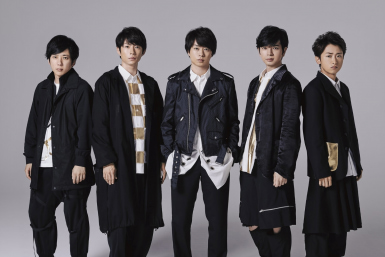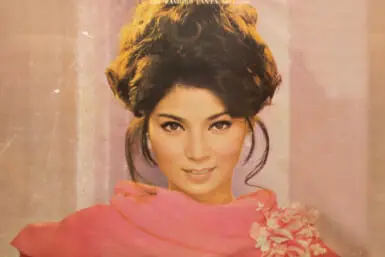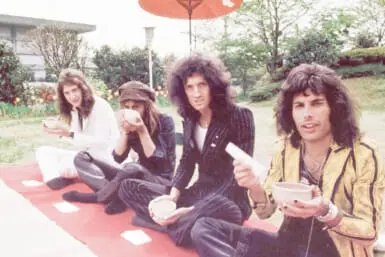With past Japanese songs such as “Plastic Love” by Mariya Takeuchi and Miki Matsubara’s “Mayonaka no Door: Stay with Me” suddenly becoming international hits in the last few years, we thought we’d look at some other tracks from this country that have made waves overseas. From Kyu Sakamoto and Pink Lady to Babymetal and LiSA, we’ve got all generations covered.
1. “Ue o Muite Arukou” (“Sukiyaki”) – Kyu Sakamoto
One of the best-selling singles of all time, “Ue o Muite Arukou” was a song written out of frustration. Rokusuke Ei penned the track after a failed student protest against continued American military presence in Japan. The words, “I look up as I walk so the tears won’t fall,” reflect his disillusionment yet determination to remain optimistic following the ratification of the Treaty of Mutual Cooperation and Security between the two countries. The music for the single was composed by piano prodigy Hachidai Nakamura while singer Kyu Sakamoto provided the vocals.
Rechristened “Sukiyaki” for western audiences (as British record executive Louis Benjamin felt the original title would be too difficult for people overseas), it was released in America in 1963, becoming the first track by an Asian artist to top the Billboard Top 100. In fact, it remained the only one until Korean group BTS achieved the feat with their single “Dynamite” in 2020. A smash hit around the globe, “Sukiyaki” sold more than 13 million copies. It’s been covered or sampled in various languages by many artists including A Taste of Honey, Snoop Dogg and Avicii.
2. “Kiss in the Dark” – Pink Lady
Aside from Kyu Sakamoto, only one other Japanese recording act has broken the top 40 in America. That was Pink Lady with their catchy hit, “Kiss in the Dark” which debuted on Leif Garrett’s show in 1979. It was released along with a B-Side cover of The Left Banke’s “Walk Away Renee” on May 1 of that year in 40 countries around the world followed by its Japan release four months later. It was the first song by the pair that failed to make the top ten 10 in their native homeland. However, it was their most successful hit internationally, peaking at number 37 on the Billboard Top 100.
By that point the bubbly duo of Mie (Mitsuyo Nemoto) and Kei (Keiko Matsuda) had become a phenomenon back home. They spent a combined total of 63 weeks on top of the Oricon Charts. That record was eventually surpassed by B’z in 2015. With “Kiss in the Dark,” the aim was to break the American market. They followed it up with an eponymous album in English before fronting an NBC variety show with comedian Jeff Altman. High-profile guests such as Blondie and Alice Cooper failed to stop the show from flopping. It was dropped after five episodes.
3. “Subete no Hito no Kokoro ni Hana wo” (“Flowers for your Heart”) – Shoukichi Kina & Champloose
Often referred to simply as “Hana,” Shoukichi Kina’s most famous ballad “Subete no Hito Kokoro ni Hana wo” became an international hit following its release in 1980. It proved especially popular in Asian countries where it was covered by a variety of artists. The song originally featured on Shoukichi Kina & Champloose’s second album Blood Line. The 28-minute LP is considered one of the most significant records in the history of Okinawan music.
The album’s standout track was sung by the writer’s then wife Tomoko Kina with Ry Cooder – the man voted number eight in Rolling Stone magazine’s 2003 list of the greatest guitarists of all time – playing the mandolin and slide guitar. It’s a beautifully crafted song with lyrics that were reportedly inspired by the closing ceremony of the 1964 Olympic Games. As Kina watched the participants from different countries gather, he felt it looked like a “festival of peace.” Popular covers include “Dawk Mai Hai Khun” by Thai folk rock band Caravan and Hong Kong-born Taiwanese singer Wakin Chau’s “The Flowery Heart.”
4. “Merry Christmas Mr. Lawrence” (instrumental) – Ryuichi Sakamoto
“You’re the victim of men who think that they’re right, just as one day you and Captain Yonoi believed absolutely you were right, when the truth is, of course, nobody’s right.” The final scene of Nagisa Oshima’s Japanese-British war film Merry Christmas Mr. Lawrence is an extremely poignant one. What makes it even more powerful is the haunting instrumental music by Ryuichi Sakamoto that slowly builds up as Haru (Takeshi Kitano) and Lawrence (Tom Conti) bid farewell to each other.
The movie, which starred David Bowie, was nominated for the Palme d’Or at the 1983 Cannes Film Festival. Sakamoto, meanwhile, who played Captain Yonoi, won a BAFTA Award for Best Film Music. The soundtrack is most remembered for the instrumental version of the title track. There’s also the vocal version titled “Forbidden Colours” after Yukio Mishima’s book of the same name. Sung by Japan front man David Sylvian, it went to number one in Iceland. It also charted in the top 20 in the UK and Ireland. A remix by German trance act Watergate titled “Heart of Asia” peaked at number three in Britain.
5. “Battle Without Honor or Humanity” – Tomoyasu Hotei
Initially written for Junji Sakamoto’s 2000 yakuza film New Battles Without Honor and Humanity (also known as Another Battle), Tomoyasu Hotei’s signature instrumental track became far more famous three years later. Quentin Tarantino heard the song and decided to call the guitarist’s management to ask if he could use it for his blockbuster Kill Bill Vol. 1, believing it would be perfect for the pivotal fight scene between Beatrix “The Bride” Kiddo (Uma Thurman) and the Crazy 88 led by O-Ren Ishii (Lucy Liu). According to Hotei, Tarantino was thinking of using a Metallica song before he watched Sakamoto’s film.
“Battle Without Honor or Humanity” has since featured in several Hollywood movies, TV shows and commercials. It’s also been used by many sports teams before games including Bayern Munich and Inter Milan. “It’s funny, wherever I go around the world everyone seems to know that song, but they usually never have a clue who I am,” Hotei told The Japan Times. “I’ve played a lot of festivals in the UK and people often come up to me and tell me how much they enjoy hearing the Kill Bill cover. I don’t mind though; I just love the fact that my music’s getting recognized outside Japan.”
6. “Gimme Chocolate” – Babymetal
In the 1980s and 1990s Shonen Knife was the Japanese band that was most embraced by the overseas rock community. Sonic Youth and Nirvana were among their biggest fans. “When I finally got to see them live, I was transformed into a hysterical nine-year-old girl at a Beatles concert,” stated Kurt Cobain. In recent years, Babymetal has been the group that has grabbed the attention of major international acts. This includes the likes of Red Hot Chili Peppers, Guns N’ Roses, Korn and Metallica. They have all invited the kawaii metal band to support them. “We saw them in 2013 at a festival and were astounded by their awesomeness,” said Metallica drummer and co-founder Lars Ulrich.
Babymetal’s biggest hit to date has been “Gimme Chocolate,” a song about wanting to eat chocolate but being afraid of putting on weight. Arranged by bass guitarist Takeshi Ueda, it’s the perfect example of what the group is all about: the saccharine sound of sugary pop mixed with thrash metal. The track hit a chord with fans in America, peaking at number five in the US World Digital Songs Chart. It was also the hit they chose to play on The Late Show with Stephen Colbert, their American TV debut.
7. “Gurenge” & “Homura” – LiSA
Since going solo 10 years ago, LiSA has made quite a name for herself, particularly with fans of anime. Her songs have featured in various series, including, most famously, Demon Slayer: Kimetesu no Yaiba. Performing the opening theme song for the manga-adapted show helped propel her fan base to a whole new level. Titled “Gurenge” (“Red Lotus”), it became the first track by a female artist to surpass one million downloads on Oricon’s Digital Single Ranking Chart. A hit with foreign fans, it’s been covered by many prominent international YouTube artists.
“Homura” (“Flame”), the theme song of the movie Demon Slayer: Mugen Train has arguably been an even bigger success. At the time of writing, the music video of the single has garnered over 194 million views on YouTube. Winner of the grand prize at the 62nd Japan Record Awards, it has become increasingly popular overseas. This is in no small part thanks to Mugen Train which has topped box offices in several countries around the world including America, Australia, South Korea and Spain. “I wrote both ‘Gurenge’ and ‘Homura’ with the anime series and film in mind,” LiSA recently told TW. “They are about overcoming difficulties and finding hope in bleak situations which is fitting for these times.”









